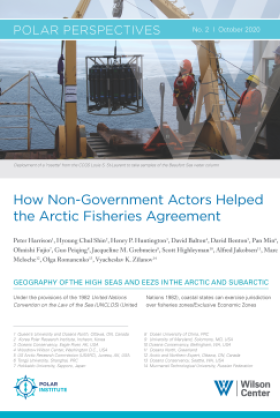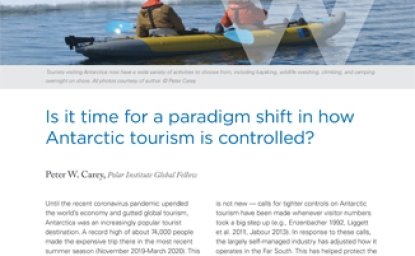Polar Perspectives No. 2 | How Non-Government Actors Helped the Arctic Fisheries Agreement


Arctic sea ice is undergoing very rapid change, and 2020 set the second-lowest record for sea ice extent in history. The Central Arctic Ocean (CAO) – a high seas area where the Arctic states’ exclusive economic zones are totally enclosed outside fisheries jurisdictions – remains fully or partially ice-covered from October to May. Yet summer sea ice recession has created potential new fisheries access.
There are a number of high seas areas in the Arctic Ocean and, in the Bering Sea Donut Hole, failure to quickly conclude international treaty negotiations allowed the crash of the once valuable and infamous pollock stock. To avoid a similar situation in the CAO, the Arctic states built on previous diplomatic efforts and concluded negotiations on the CAO Fisheries Agreement in less than two years. Meanwhile, non-government actors and Indigenous people spearheaded multi-pronged engagement outside the scope of the diplomatic negotiations that attracted more, better-informed experts and parties.
In this second edition of Polar Perspectives, Peter Harrison et al. argues the CAO Fisheries Agreement (2018), became a landmark in both conservation and Arctic governance. All ten signatories – including China, the European Union, Japan, the Republic of Korea and six Arctic states – cite the CAO Fisheries Agreement as a powerful example of international cooperation and commitment to basic principles of conservation.
Contributors: Peter Harrison, Hyoung Chul Shin, Henry P. Huntington, David Balton, David Benton, Pan Min, Ohnishi Fujio, Guo Peiqing, Jacqueline M. Grebmeier, Scott Highleyman, Alfred Jakobsen, Marc Meloche, Olga Romanenko, Vyacheslav K. Zilanov. All photos courtesy of Peter Harrison.

Polar Institute
Since its inception in 2017, the Polar Institute has become a premier forum for discussion and policy analysis of Arctic and Antarctic issues, and is known in Washington, DC and elsewhere as the Arctic Public Square. The Institute holistically studies the central policy issues facing these regions—with an emphasis on Arctic governance, climate change, economic development, scientific research, security, and Indigenous communities—and communicates trusted analysis to policymakers and other stakeholders. Read more

Explore More
Browse Insights & Analysis
Greenland’s New Governing Coalition Signals Consensus


